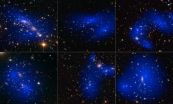Antarctic ice shelves rapidly thinning
New study reveals accelerating losses over two decades
2015-03-26
(Press-News.org) A new study led by Scripps Institution of Oceanography at UC San Diego researchers has revealed that the thickness of Antarctica's floating ice shelves has recently decreased by as much as 18 percent in certain areas over nearly two decades, providing new insights on how the Antarctic ice sheet is responding to climate change.
Data from nearly two decades of satellite missions have shown that the ice volume decline is accelerating, according to a study published on March 26, 2015, in the journal Science and supported by NASA. Scripps graduate student Fernando Paolo, Scripps glaciologist Helen Amanda Fricker, and oceanographer Laurie Padman of Earth & Space Research (a non-profit institute specializing in oceanography research) constructed a new high-resolution record of ice shelf thickness based on satellite radar altimetry missions of the European Space Agency from 1994 to 2012.
Merging data from three overlapping missions, the researchers identified changes in ice thickness that took place over more than a decade, an advancement over studying data from single missions that only provide snapshots of trends.
Total ice shelf volume (mean thickness multiplied by ice shelf area) across Antarctica changed very little from 1994 to 2003, then declined rapidly, the study shows. West Antarctic ice shelves lost ice throughout the entire observation period, with accelerated loss in the most recent decade. Earlier gains in East Antarctic ice shelf volume ceased after about 2003, the study showed. Some ice shelves lost up to 18 percent of their volume from 1994 to 2012.
"Eighteen percent over the course of 18 years is really a substantial change," said Paolo. "Overall, we show not only the total ice shelf volume is decreasing, but we see an acceleration in the last decade."
While melting ice shelves do not contribute directly to sea-level rise, the researchers indicate that there is an important indirect effect.
"The ice shelves buttress the flow from grounded ice into the ocean, and that flow impacts sea-level rise, so that's a key concern from our new study," said Fricker.
Under current rates of thinning, the researchers estimate the ice shelves restraining the unstable sector of West Antarctica could lose half their volume within the next 200 years.
"This work demonstrates the power of satellite observations to understand change in the great polar ice sheets," said Thomas Wagner, Program Manager for Cryospheric Sciences at NASA Headquarters. "And with data spanning decades, we can understand some of the most important changes and their implications for sea-level rise."
Fricker said future studies will concentrate on the causes behind changes in ice shelf volume, including the effects of the atmosphere and ocean.
"We're looking into connections between El Niño events in the tropical Pacific and changes in the Antarctic ice sheet," said Paolo. "It's very far apart but we know that these teleconnections exist. That may ultimately allow us to improve our models for predicting future ice loss."
INFORMATION:
ELSE PRESS RELEASES FROM THIS DATE:
2015-03-26
HOUSTON - (March 26, 2015) - Taking out the garbage is a crucial step in housecleaning.
Similarly, autophagy is the body's first-line of defense against the buildup up of toxic substances, degrading old organelles and proteins to provide new substrates and building blocks. In this way, autophagy prevents the buildup of "garbage" that can result in destruction of neurons and cause neurologic diseases.
A forward genetic screen in Drosophila melanogaster (fruit flies) identified mutant copies, or alleles, of a gene called cacophony associated with defects in autophagy ...
2015-03-26
While most of us recover from influenza after a week, it can be a very severe disease, and even fatal in rare cases, with no reason for physicians to have expected such an outcome. By analysing the genome of a little girl who contracted a severe form of influenza at the age of two and a half years, researchers at the Laboratory of Human Genetics of Infectious Diseases (a joint French-American international laboratory), which brings together researchers from Inserm, Paris Descartes University, and physicians from the Paris public hospitals (AP-HP; Necker Hospital for Sick ...
2015-03-26
New research shows bacteria can use tiny magnetic particles to effectively create a 'natural battery.' According to work published in journal Science on 27 March, the bacteria can load electrons onto and discharge electrons from microscopic particles of magnetite. This discovery holds out the potential of using this mechanism to help clean up environmental pollution, and other bioengineering applications. The European Association of Geochemistry is highlighting this work as especially interesting.
According to study leader Dr James Byrne (Tübingen):
"The geochemistry ...
2015-03-26
A study led by Cathy Spatz Widom, Distinguished Professor of Psychology at John Jay College, found that offspring of parents with histories of child abuse and neglect are themselves at risk for childhood neglect and sexual abuse but not physical abuse. Titled "Intergenerational Transmission of Child Abuse and Neglect: Real or Detection Bias?" the study's findings were reported in the March 27 issue of the journal Science.
As part of a prospective longitudinal study, Widom followed a large group of children with documented cases of childhood abuse and neglect and a demographically ...
2015-03-26
A new study, published today in the journal PloS Neglected Tropical Diseases has given new insights into the spread of rabies in the Middle East, showing that the deadly disease regularly moves between countries in the region.
The international team of researchers including scientists from the University of Surrey and the Animal and Plant Health Agency, have mapped the spread of rabies in the region to help inform control methods.
Previous studies have demonstrated that rabies, a fatal disease transmitted by the bite or scratch from an infected animal, still kills approximately ...
2015-03-26
Dark matter is one of science's great mysteries. It makes up an enormous amount matter in the universe, it is invisible, and it does not correspond to anything in the realm of our experience. Different theories compete for an explanation, but so far none of them has prevailed. In a collaborative study between École Polytechnique Fédérale de Lausanne (EPFL) and the University of Edinburgh, scientists have studied how dark matter behaves when galaxy clusters collide with each other over billions of years. Published in Science, their findings challenge at least ...
2015-03-26
Foraging bats obey their own set of 'traffic rules', chasing, turning and avoiding collisions at high speed, new research from the University of Bristol, UK has found.
Dr Marc Holderied of Bristol's School of Biological Sciences studied pairs of Daubenton's bats (Myotis daubentonii) foraging low over water for stranded insects at a site near the village of Barrow Gurney in Somerset, UK.
He said: "Collective movements of flocking birds or shoaling fish are amongst the most fascinating natural phenomena, and everyone has experienced the challenges of walking through ...
2015-03-26
CHAPEL HILL, NC - A team of researchers has discovered HIV can begin replicating in the brain as early as four months after initial infection. The study followed 72 treatment naïve participants during the first two years of HIV infection. Through analysis of cerebral spinal fluid (CSF) and blood samples, 20 percent of subjects showed replication in the central nervous system (CNS) at four months. Additionally, 30 percent of participants showed evidence of a marked CSF inflammatory response in at least one time point and 16 percent of study volunteers showed a marked ...
2015-03-26
The fact that the neutron is slightly more massive than the proton is the reason why atomic nuclei have exactly those properties that make our world and ultimately our existence possible. Eighty years after the discovery of the neutron, a team of physicists from France, Germany, and Hungary headed by Zoltán Fodor, a researcher from Wuppertal, has finally calculated the tiny neutron-proton mass difference. The findings, which have been published in the current edition of Science, are considered a milestone by many physicists and confirm the theory of the strong interaction. ...
2015-03-26
Astronomers using observations from the NASA/ESA Hubble Space Telescope and NASA's Chandra X-ray Observatory have studied how dark matter in clusters of galaxies behaves when the clusters collide. The results, published in the journal Science on 27 March 2015, show that dark matter interacts with itself even less than previously thought, and narrows down the options for what this mysterious substance might be.
Dark matter is a giant question mark looming over our knowledge of the Universe. There is more dark matter in the Universe than visible matter, but it is extremely ...
LAST 30 PRESS RELEASES:
[Press-News.org] Antarctic ice shelves rapidly thinning
New study reveals accelerating losses over two decades

